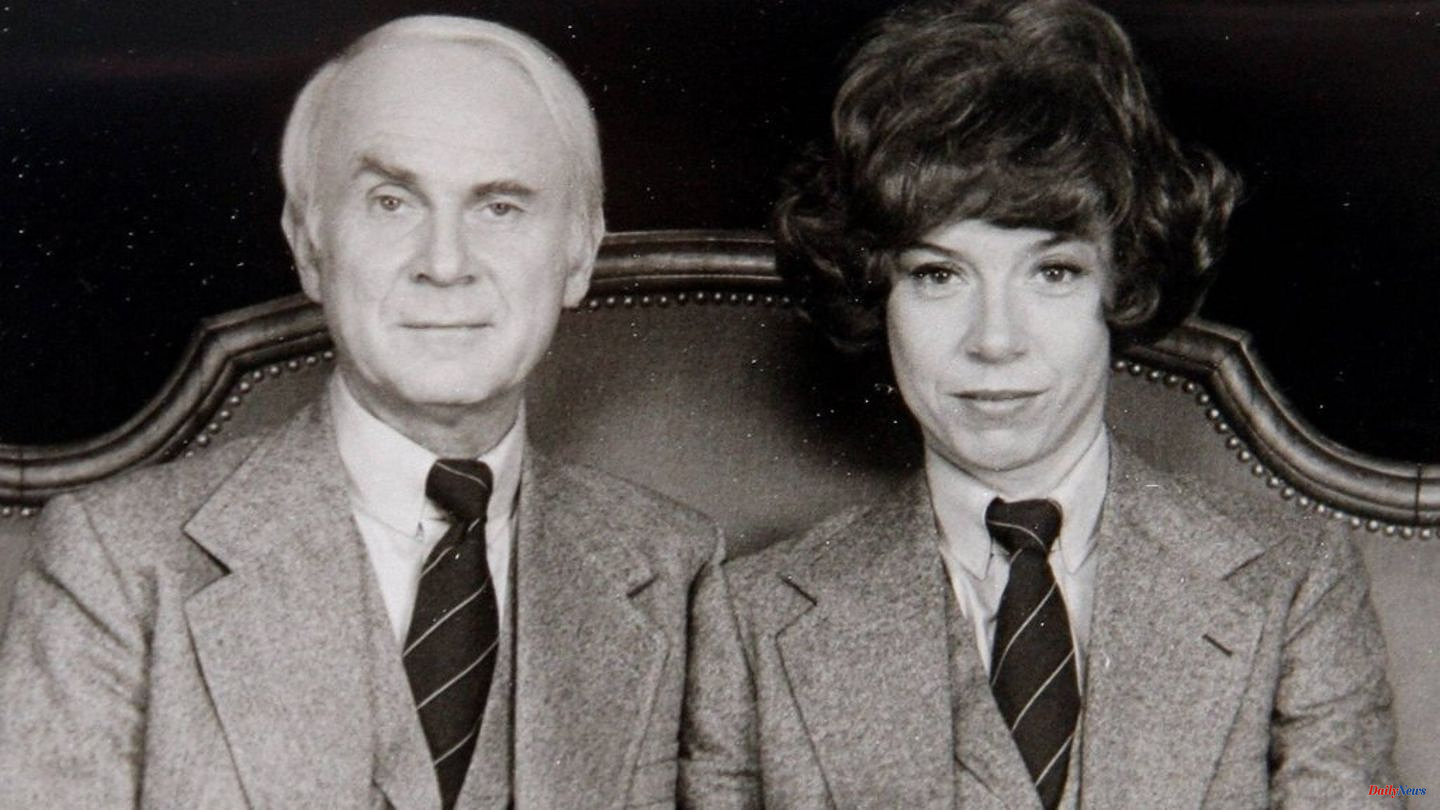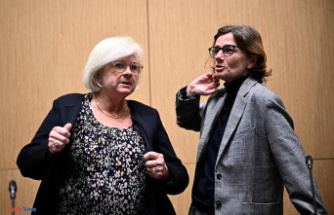She wasn't a film beauty. And definitely not a radiant diva. She could look grumpy and haggard as if that was her true nature. Pictures are also remembered that show her with a helpless and helpless expression. Or with a neat, neat but infinitely bored facial expression.
At such a moment - it was in the 1980s - the ZDF showmaster Wim Thoelke (1927-1995) wanted to ensnare her in his successful show "Der Große Preis" when he started to greet him with a strong conviction: "You are a very beautiful woman ...." He didn't get any further, because all that could be heard was the peals of laughter from his interlocutor, and she could laugh like no other.
So she was, Evelyn Hamann, this gifted comedian whose self-mockery had more bite than the puns of contemporary comedians. On August 6, the great actress, who died of cancer in 2007, would have turned 80. The audience misses her expressive character face to this day.
A classmate who did her Abitur with her at the Bondenwald Gymnasium in Hamburg once described her friend's talent, which was already visible during school: "We never thought Evelyn was particularly pretty, but she could play that she was beautiful."
She preferred to portray women who were shaken by life, by fate or by a weird situation. It was important to her "that the viewer thinks: Yes, I really know a woman like that." She succeeded in doing this most beautifully as the congenial partner of the great humorist Loriot (1923-2011), who was also unique. At his side, she became a cult figure.
It was not an easy path for Evelyn Hamann to get there, although she was embedded in an artistic environment from the start. Her father Bernhard Hamann was a violinist and concertmaster of the NDR Symphony Orchestra, her mother a singer and music teacher. Her brother Gerhard Hamann was a professor of violin cello, a grandfather a concert master in Berlin.
Evelyn could have had a career as a singer, too, because she had a crystal-clear voice, which later benefited her as an actress. However, after completing her education at the University of Music and Performing Arts in her hometown of Hamburg, she decided to pursue a career in theater. It wasn't easy for her.
In one of her rare interviews, the media-shy Hamann addressed her "distinctive appearance" according to "NOZ", which ensured that her career only got off to a "sluggish" start: "I wasn't the prototype of Gretchen, wasn't I kind and lovely at the very least. I was desperate for roles."
And she was lucky: the head of entertainment at Radio Bremen, Jürgen Breest, was looking for an actress for the TV productions of Loriot sketches. He found what he was looking for at the Theater Bremen and discovered, if you will, Evelyn Hamann. She was invited to audition.
The first encounter with Loriot developed like a skit, because the master wanted "a blond, chubby housewife", on the other hand, the brunette and rather gaunt Evelyn had convinced him as an actress. So he suggested: "Dear Ms. Hamann, if you eat pork knuckle every day for several weeks at our expense, do you think you'll get fatter?" After politely declining the plan, Loriot decided, "Well, don't be chubby then!"
Evelyn Hamann became Loriot's partner from 1976, a role that made her a star. The audience saw her in all the different roles as Loriot's better half, for example as housewife and wife Lieselotte Hoppenstedt, who wants to organize a festive Christmas Eve - "And now let's make ourselves comfortable" - which of course ends in a wonderful chaos. Or who acquires a yodel diploma, because "I'll have something in my hand when the children are out of the house - I'll have something of my own!" and shot at himself with a representative of the vacuum cleaner company Heinzelmann and then whispered happily in a wine intoxication: "Heinzelmann sucks and blows where mommy can otherwise only blow."
"So she became the female protagonist in Loriot's finely drawn portraits of West German bourgeoisie," wrote the "Spiegel". On the other hand, she gave these female characters a wonderful eccentricity with a tendency towards chaos and anarchy, e.g. as "Miss Dinkel" in the armchair of her lovestruck boss or in the sketch "Die Noodle", in which she is hit on by an admirer who insists: " Please don't say anything now, Hildegard!" And: "You drive me crazy!" She just wants to make it clear to the man that a piece of spaghetti is wandering around his face...
The sheer madness comes to light in her solo number "The Table of Contents": Evelyn Hamann, as a television announcer, announces an English crime series in which the protagonists - including Lord and Lady Hesketh-Fortescue, Lord Molesworth-Houghton, the cousins Priscilla and Gwyneth Molesworth - move between the villages of Middle Fritham, Nether Addlethorpe and North Cothelstone Hall and bring the poor woman to the brink of a nervous(th)breakdown(th) over the many th sounds. Then, when there is talk of a tie, sorry tie, which will be lost at night (at night), she breaks off helplessly...
She acted in the two Loriot films "Ödipussi" (1988) and "Pappa ante portas" (1991), but also appeared in the famous "Black Forest Clinic" as the harsh housekeeper Carsta Michaelis and had the title roles in the TV series " Evelyn Hamann's Stories from Life" (1993-2005) and "Adelheid and Her Murderers" (1993-2007).
She once described the encounter with Loriot as a "gift from heaven". With him she learned that attention to detail that is essential for real comedy, because "the staging of humor requires rigor, artistry and discipline." And Loriot raved about the "wonderful actress who always managed to overcome the delicate sides of life through comedy."
The professional relationship between the two was so close that they were often considered Loriot's wife. Evelyn Hamann was married to Hans Walter Braun from 1964 to 1976, whom she met at the theater. After her divorce, she lived with her cats and for a time with her future partner, the actor Stefan Behrens (80), in an attic apartment in Hamburg's posh Harvestehude district. On October 28, 2007, she died of lymph node cancer, which had been diagnosed ten months previously.
After her death, Loriot said how much he missed her ability to quickly grasp the comedy in certain situations. "When she realized that, she had a laugh that I hadn't heard from anyone else before," he said. He can never forget that smile. And neither does the audience.












